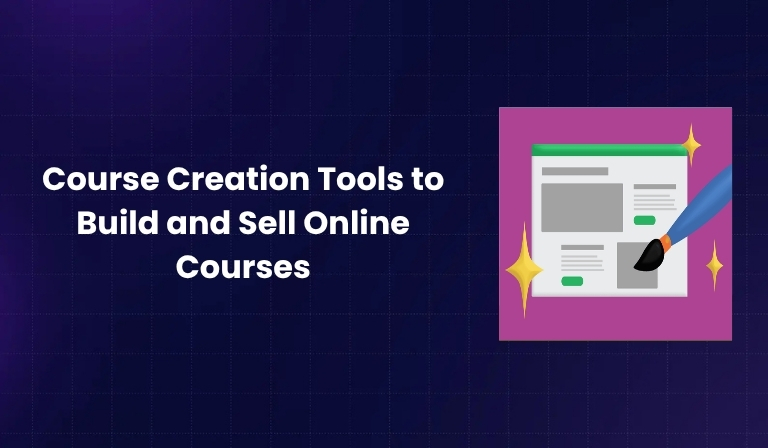The online education industry is booming in 2025. Whether you’re a teacher, coach, freelancer, or business owner, creating and selling online courses is one of the most effective ways to share your knowledge and earn money online.
But to succeed, you need the right course creation tools—platforms that help you build, design, launch, and sell your course with ease.
In this blog, we’ll explore the top 10 course creation tools in 2025, including their features, pros and cons, and who they’re best suited for. We’ll also cover some useful free tools that can help you along the way.
What Are Course Creation Tools?
Course creation tools are software platforms that help individuals and businesses build online courses. These tools support different parts of the process, including:
- Creating video lessons and course materials
- Designing learning paths and quizzes
- Hosting the course content
- Managing student enrollments and payments
- Marketing and selling the course
Some tools are all-in-one platforms, while others specialize in one task like video editing or email marketing.
Key Features to Look for in a Course Creation Tool
Before choosing a tool, consider the features that matter most to your course. Here are a few important ones:
- Ease of use: Drag-and-drop builders and simple interfaces make creation faster.
- Video hosting: Upload and share videos without needing a third-party platform.
- Landing pages: Build course sales pages to attract and convert students.
- Marketing tools: Built-in email, automation, and lead generation options.
- Payment integration: Collect payments through Stripe, PayPal, and other gateways.
- Analytics: Track student progress and sales performance.
- Community features: Forums or groups to engage with your learners.
Top 10 Course Creation Tools to Try in 2025
1. Thinkific
Thinkific is a popular platform that allows you to create, host, and sell your online courses with full control over branding and pricing.
Key Features:
- Drag-and-drop course builder
- Quizzes and certificates
- Custom domain support
- Integration with marketing tools
Pros:
- Free plan available
- Easy to use
- Great customization options
Cons:
- Limited email marketing tools on lower plans
Best For: Educators who want a customizable and scalable platform.
2. Teachable
Teachable is a simple and affordable course creation tool for beginners and solo creators.
Key Features:
- One-click checkout
- Unlimited courses and students
- Built-in sales pages
- Payment handling with taxes
Pros:
- Beginner-friendly
- Built-in payment processing
- Good student management
Cons:
- Limited design flexibility
Best For: Solo creators looking for a fast and easy setup.
3. Kajabi
Kajabi is a premium all-in-one platform with advanced marketing and automation features.
Key Features:
- Funnels and automation
- Email marketing and CRM
- Website builder
- Podcast hosting
Pros:
- Strong marketing tools
- Beautiful templates
- Full business management features
Cons:
- Higher price point
Best For: Coaches and entrepreneurs focused on growth and automation.
4. Podia
Podia lets you sell courses, digital downloads, and memberships all from one place.
Key Features:
- Webinar hosting
- Email marketing
- Affiliate marketing support
- Easy product bundling
Pros:
- All-in-one platform
- Great customer support
- No transaction fees
Cons:
- Fewer design options compared to others
Best For: Creators with diverse product offerings.
5. LearnWorlds
LearnWorlds focuses on interactive learning and detailed customization for course structure and appearance.
Key Features:
- Interactive videos and assessments
- Course certificates
- Analytics dashboards
- SCORM compliance
Pros:
- High-level customization
- Supports interactivity
- Modern UX
Cons:
- Slight learning curve for beginners
Best For: Course creators needing advanced features and customization.
Also Check: (2025) Top 10 Richest YouTubers in India
6. Mighty Networks
Mighty Networks helps you build a course and an engaged community in the same place.
Key Features:
- Community forums
- Events and live streams
- Online courses and challenges
- Mobile apps included
Pros:
- Strong community features
- Clean mobile experience
- All-in-one for course + community
Cons:
- Less focus on traditional LMS structure
Best For: Creators who want to build a membership or learning community.
7. Pathwright
Pathwright is built for cohort-based and action-driven learning experiences.
Key Features:
- Guided paths and task tracking
- Cohort scheduling
- Course automation
- Student messaging
Pros:
- Highly structured learning journeys
- Great for team-based learning
- Good for training programs
Cons:
- Less visual customization
Best For: Teams, coaches, and educators offering cohort-based learning.
8. Simplero
Simplero combines course creation, CRM, and automation into one streamlined tool.
Key Features:
- CRM + email marketing
- Funnels and landing pages
- Subscription management
- Built-in payments
Pros:
- No need for extra tools
- Good automation options
- Handles backend + frontend
Cons:
- Complex interface at first
Best For: Entrepreneurs managing a full online business.
9. Skillshare
Skillshare is a well-known marketplace for creative skills and short-format learning.
Key Features:
- Built-in audience
- Royalty-based income model
- Video-first courses
- Creator community
Pros:
- Instant exposure
- Simple upload process
- Great for passive income
Cons:
- Lower course pricing
- Limited customization
Best For: Designers, artists, and creators wanting quick reach.
10. Udemy
Udemy is one of the biggest online course marketplaces with a global audience.
Key Features:
- Course certification
- Huge user base
- Promotion and ads by Udemy
- Instructor revenue sharing
Pros:
- Massive audience
- Easy publishing
- Free to join
Cons:
- Limited control over pricing
- Revenue share model
Best For: Instructors looking to reach a large audience without handling marketing.
Bonus Free & Low-Cost Tools for Course Creators
Here are some helpful tools that support your course creation journey:
Video Recording & Editing
- Veed.io: Online video editing with text overlays and trimming.
- Camtasia: Screen recording and video editing (free trial available).
- OBS Studio: Free and open-source screen recorder.
Design & Visuals
- Canva: Easy drag-and-drop tool for presentations, thumbnails, and PDFs.
- Loom: Record webcam + screen to explain lessons.
- Zoom: Run live sessions or webinars for learners.
Marketing & Automation
- ConvertKit: Email marketing for course announcements (free plan).
- Zapier: Automate tasks between your course platform and other tools.
- Stripe: Accept payments globally with zero monthly fees.
- GetResponse: Create landing pages and email campaigns for promotion.
How To Choose the Right Tool for Your Needs
Choosing a course creation tool depends on your goals and preferences. Here’s what to consider:
- Type of content: Do you need video lessons, quizzes, downloads, or live sessions?
- Budget: Are you looking for a free or premium platform?
- Marketing needs: Do you want built-in email and automation tools?
- Community: Will you need discussion forums or member groups?
- Scalability: Can the platform grow with your audience?
Conclusion
There’s no one-size-fits-all course creation platform. But the top 10 tools listed above can help you build and sell courses with confidence in 2025.
Start with a tool that matches your goals, budget, and audience type. Whether you’re launching your first course or scaling a coaching business, there’s a platform for you.
Don’t forget to take advantage of the free tools to boost your course content and promotion efforts.
FAQs
1. What is the best free tool to create an online course?
Thinkific offers a generous free plan for beginners.
2. Can I sell online courses without a website?
Yes, platforms like Udemy and Skillshare allow you to publish and sell courses without needing a personal website.
3. Which platform offers the best marketing features?
Kajabi offers powerful automation and funnel-building tools.
4. What tools help with student engagement and interactivity?
LearnWorlds and Pathwright include interactive videos, quizzes, and guided learning paths.
5. Can I switch platforms after launching my course?
Yes, but it may involve some manual work like exporting videos, student lists, and payment details.

